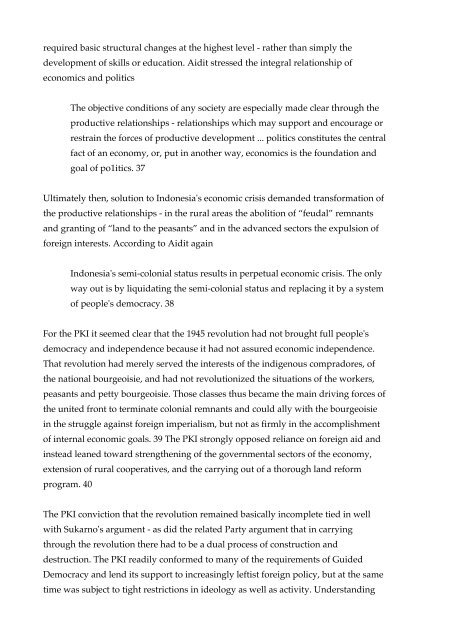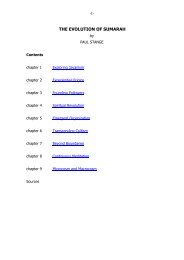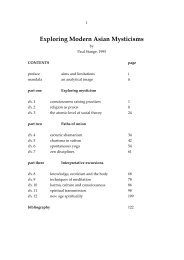Javanese Mystical and Marxist Dialectics - Paul Stange
Javanese Mystical and Marxist Dialectics - Paul Stange
Javanese Mystical and Marxist Dialectics - Paul Stange
Create successful ePaper yourself
Turn your PDF publications into a flip-book with our unique Google optimized e-Paper software.
equired basic structural changes at the highest level - rather than simply thedevelopment of skills or education. Aidit stressed the integral relationship ofeconomics <strong>and</strong> politicsThe objective conditions of any society are especially made clear through theproductive relationships - relationships which may support <strong>and</strong> encourage orrestrain the forces of productive development ... politics constitutes the centralfact of an economy, or, put in another way, economics is the foundation <strong>and</strong>goal of po1itics. 37Ultimately then, solution to Indonesia's economic crisis dem<strong>and</strong>ed transformation ofthe productive relationships - in the rural areas the abolition of “feudal” remnants<strong>and</strong> granting of “l<strong>and</strong> to the peasants” <strong>and</strong> in the advanced sectors the expulsion offoreign interests. According to Aidit againIndonesia's semi-colonial status results in perpetual economic crisis. The onlyway out is by liquidating the semi-colonial status <strong>and</strong> replacing it by a systemof people's democracy. 38For the PKI it seemed clear that the 1945 revolution had not brought full people'sdemocracy <strong>and</strong> independence because it had not assured economic independence.That revolution had merely served the interests of the indigenous compradores, ofthe national bourgeoisie, <strong>and</strong> had not revolutionized the situations of the workers,peasants <strong>and</strong> petty bourgeoisie. Those classes thus became the main driving forces ofthe united front to terminate colonial remnants <strong>and</strong> could ally with the bourgeoisiein the struggle against foreign imperialism, but not as firmly in the accomplishmentof internal economic goals. 39 The PKI strongly opposed reliance on foreign aid <strong>and</strong>instead leaned toward strengthening of the governmental sectors of the economy,extension of rural cooperatives, <strong>and</strong> the carrying out of a thorough l<strong>and</strong> reformprogram. 40The PKI conviction that the revolution remained basically incomplete tied in wellwith Sukarno's argument - as did the related Party argument that in carryingthrough the revolution there had to be a dual process of construction <strong>and</strong>destruction. The PKI readily conformed to many of the requirements of GuidedDemocracy <strong>and</strong> lend its support to increasingly leftist foreign policy, but at the sametime was subject to tight restrictions in ideology as well as activity. Underst<strong>and</strong>ing




